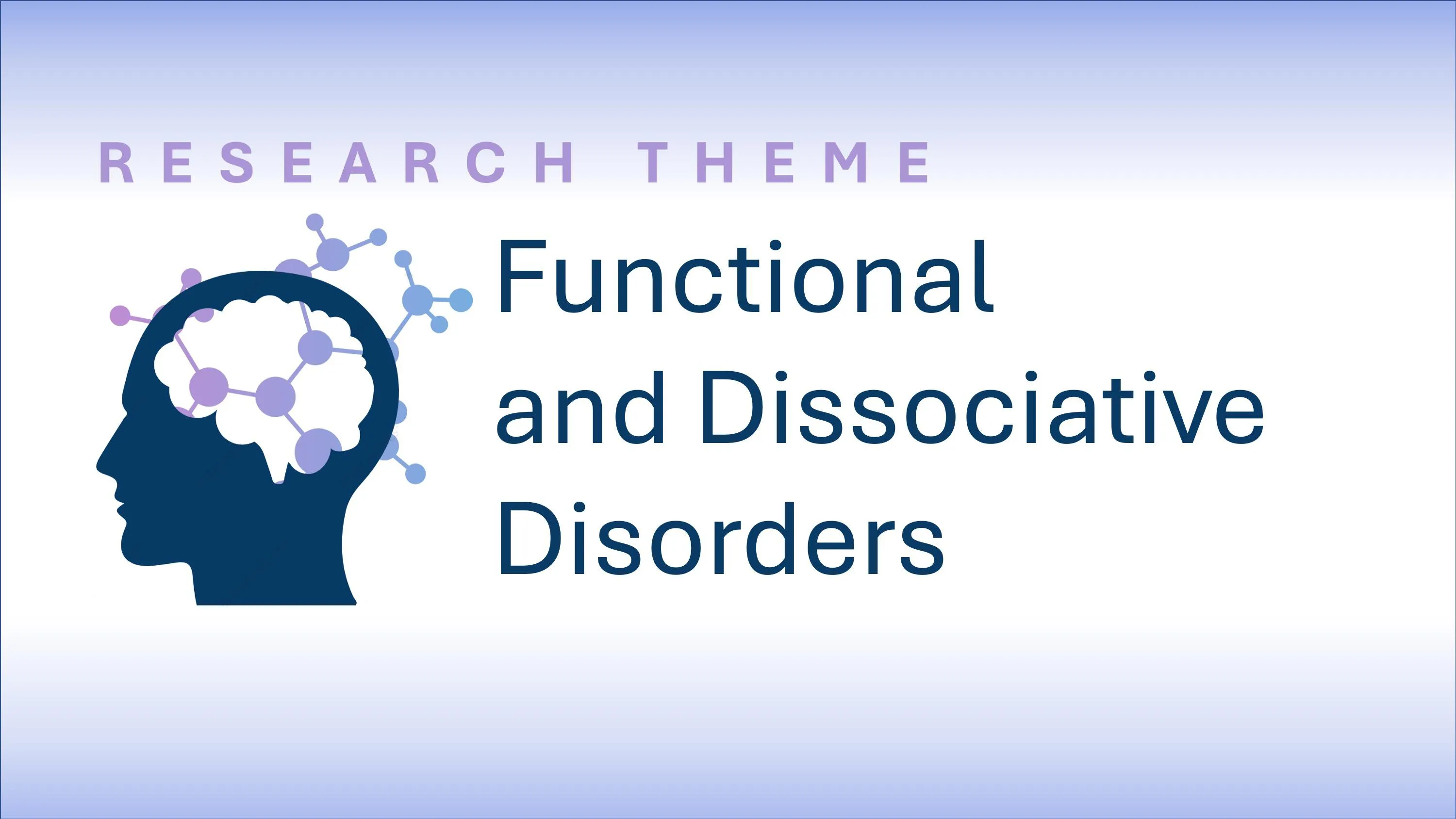Functional and Dissociative Disorders
Aims
This is the Functional and Dissociative Disorders Theme of the IoPPN Neuropsychiatry Research & Education Group.
We are an expanding and increasingly broad group of researchers from across the clinical and basic neurosciences investigating the mechanisms, and improving treatments, outcomes and public understanding, of functional and dissociative disorders, with a particular focus on Functional Neurological Disorder (FND). Our work is embedded and entwinned with the largest and most comprehensive FND service in the UK within the South London & Maudsley NHS Foundation Trust (SLAM) neuropsychiatry service as well as multiple other regional and national clinical services of international reputation. Our interdisciplinary approach connects us, with mutual benefits, to many related academic and clinical fields from neurophysiology to neuropsychology as well as an increasing range of basic and clinical neurosciences such as trauma and neurodevelopmental research groups and services.
Our research has led to many of the key planks in the current evidence base for managing FND and other disorders - from developing consensus on how to measure FND., to the only two fully- powered treatment trials for FND (specialist CBT for seizures, with the CODES trial and physiotherapy for motor symptoms, with the Physio4FMD trial). In addition, we are and is currently pioneering the development and trials of desperately needed new treatments such as neuromodulation (e.g. TMS trials), neurotechology (e.g. VR and Brain-Computer Interface), novel pharmacological (e.g. psychedelics and therapeutic sedation/interviews) and psychological (e.g. hypnosis) approaches - many of which are neuroscientifically informed updates and refinements of treatments used in the past.
We have pioneered education of these poorly understood and stigmatised disorders. Front and centre of this is patient public involvement (PPI) work and we have been at the forefront of engagement and developing close working relationships with patients and patient groups. We have developed an increasing program of education at all levels; for healthcare professionals, where poor understanding propagates stigma and poor care, to students/trainees across academic and clinical medicine, to the wider public and key decision makers who can help reduce stigma and improve funding for research and clinical services.
Members
Lead/Key investigators:
The theme is led by Dr Tim Nicholson and benefits from the input from many other international leaders in FND and related disorders. Tim’s work includes mechanistic studies, improving outcome measurement and developing novel neuromodulation (e.g. TMS) and pharmacological (e.g. psychedelic) treatments.
Professor Mark Edwards has led on the development of key mechanistic models, neurophysiological and clinical diagnostics as well treatments, especially specialist physiotherapy for motor symptoms, and more recently health services research.
Dr Paul Shotbolt is leading on the development of the application of neurotechnologies to understanding FND’s mechanisms and developing new treatments.
Professor Laura Goldstein, who has recently retired, previously led on the development of specialist CBT for functional seizures and subsequent RCTs.
Other King’s Health Partners investigators/collaborators:
Experimental Psychology: Susannah Pick, Devin Terhune, Sarah Cope
Cognitive Neuroscience: Devin B. Terhune is a Reader in Experimental Psychology. His research draws on methods and theories from cognitive neuroscience and experimental psychology (EEG, psychophysics, latent variable modelling) to study various features of awareness and their modulation through suggestion (placebo, nocebo, and hypnosis). Current work in his lab aims to identify the neurocognitive substrates of dissociative disorders, the role of placebo/nocebo effects in psychedelics, and the use of nitrous oxide to experimentally model dissociation and hallucinations.
Neurophysiology: Joel Winston, Franz Brunnhuber, Irene Faiman, Ioannis Stavropoulos, Alastair Purves, Ricci Hannah
Neuropsychiatry: Quinton Deeley, Norman Poole, Tim Segal, Nick Medford, Myles Gutkin
Neurology: Biba Stanton, Albert Joseph
Neurodevelopmental disorders: Francesca Happe, Ben Baig, Tammy Hedderly
General medicine: Caroline Jolley (respiratory)
Patient involvement: Abby Westguard-Bradley
Trainees/students:
PhD students: Matt Butler, Cate Bailey, Daruj (Earl) Aniwattanapong, Hamilton Morrin, Lily Smythe
Integrated Academic Trainees: Isabella Conti, Daniel Morris
Current research projects
Mechanisms:
- Neurophysiology of FND – Daruj Aniwattanapong, Mark Edwards
- Emotion processing, interoception & dissociation – Susannah Pick and NEUROADS lab team investigating transdiagnostic Neurological, Affective and Dissociative Symptoms
- Stigma and illness models – Cate Bailey, Norman Poole and Tim Nicholson
- Psychedelics (psilocybin) and FND – Matt Butler Psifund study
- Sensory symptoms – Glenn Neilsen and Mark Edwards
- Suggestion/Placebo/Nocebo - Livia Asan, Tim Nicholson, Quintion Deeley, Devin Terhune, Mark Edwards
- ASD and FND overlap and interactions – Lilly Smythe, Mark Edwards, Ben Baig, Francesca Happe, Tim Nicholson
- Outcome measures – Susannah Pick, Tim Nicholson & International collaborators
Trials/therapeutics:
- Trial of TMS for FND limb paralysis (TONICS) - Daruj (Earl) Aniwattanapong, Tim Nicholson, Alistair Purves
- Brain Computer Interface and VR for motor FND – Paul Shotbolt and Hamilton Morrin
- Acceptance and Commitment Therapy (ACT) for functional cognitive disorder – Norman Poole
- Abreaction, therapeutic sedation/drug interview – Norman Poole
- EMDR for FND – Sarah Cope
Past research projects and selected/key publications
See the personal webpages of individual researchers for full details of past publications
Mechanisms:
- Bayesian/computational approaches
- Attention
- Emotion processing
- Stressors/life events
- Suggestion/placebo/nocebo
- Structural imaging
Trials/therapeutics:
- Specialist CBT for functional seizures – CODES RCT
- Specialist physiotherapy for functional motor symptoms - Physio4FMD RCT
- Transcranial Magnetic Stimulation (TMS) for limb paralysis - TONICS feasibility RCTand systematic and narrative reviews
- Psychedelics for FND – systemic review and survey of patient viewsVirtual Reality for FND – review
- Abreaction, therapeutic sedation/drug interview – systematic review
Outcome measures:
FND Core Outcome Measures (international consensus group) papers on the theoretical complexities a Systematic review and consensus recommendations. Preprint of qualitative study of expert professional, patient and carer views.
Education
King’s Health Partners (KHP) annual Masterclass for doctors, AHPs & other interested professionals – annual in person course at Denmark Hill; free for SE London clinical staff.
KHP Learning hub online 1hr course in FND
Psychoeducation groups: new FND diagnoses and for Functional Cognitive Disorder which local patients can be referred to.





